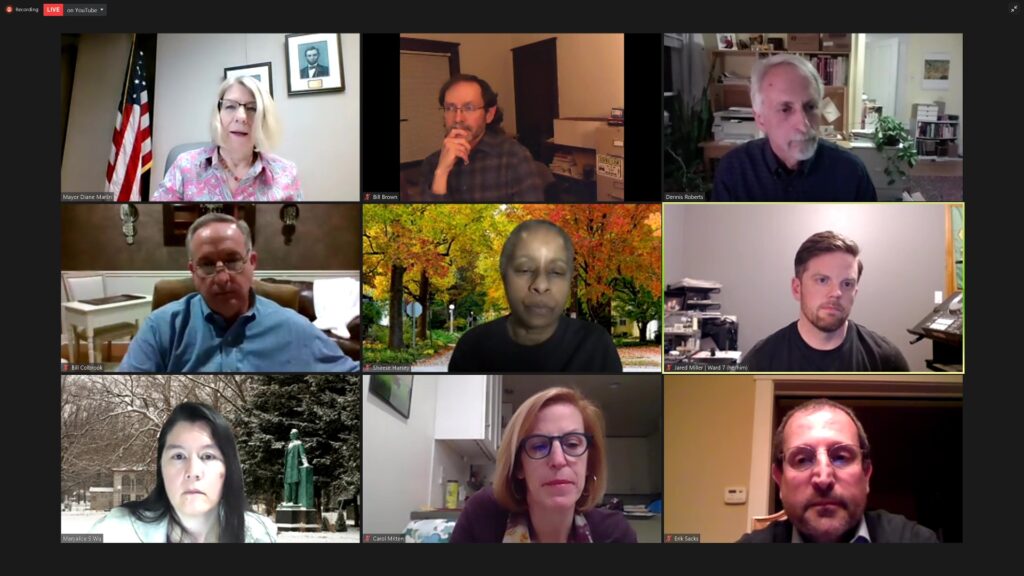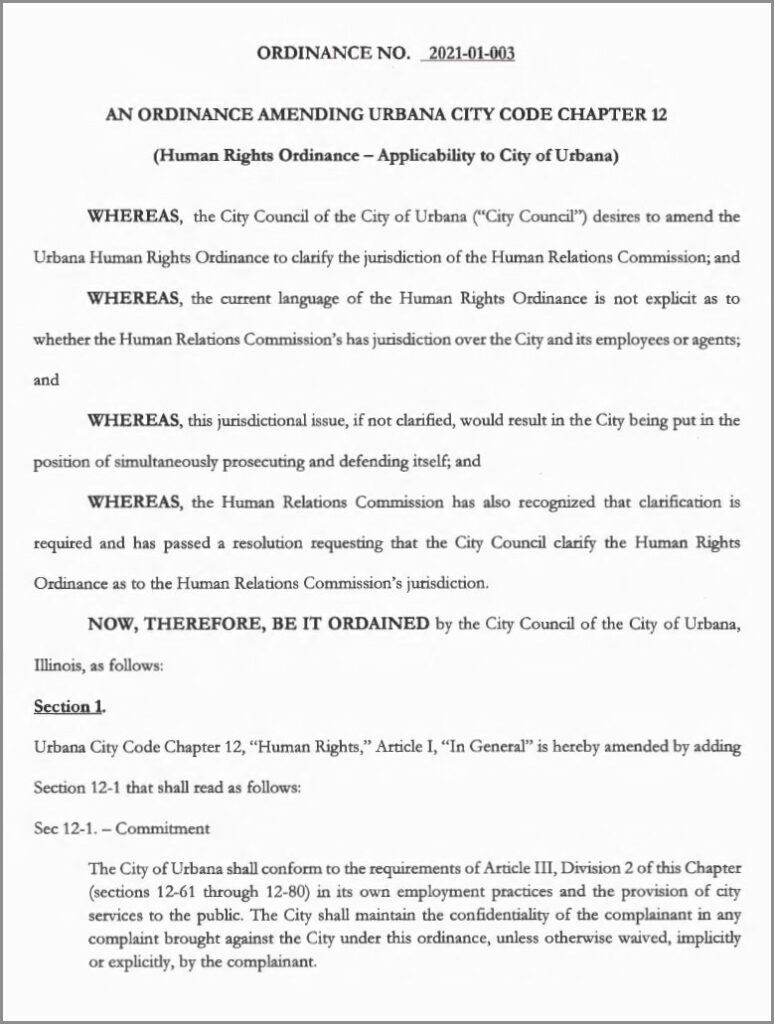
On March 8th the Urbana City Council finally brought a resolution to an issue that has been under discussion since January. The Council voted to remove City employees and officials from the Urbana Human Rights Ordinance such that residents cannot follow through on a formalized complaint against the City or its staff. Instead, complaints against the City will be handled by a poorly defined internalized process.
The motivation for this change came from the City Administrator Carol Mitten after a Human Rights appeals hearing on November 10th, 2020. An Urbana resident had submitted a complaint that the City was discriminating against potential employees in regards to conviction/arrest record, a practice that is expressly forbidden in the Urbana Human Rights Ordinance.
The City Attorney, James Simon, claimed that the complaint against the City had no merit, and denied it on reasons of both jurisdiction and probable cause. However, both determinations were readily overturned by a hearing body assembled by the Urbana Human Relations Commission (HRC) specifically to hear the appeal. Displeased with the result of the appeals hearing, Carol Mitten decided to administratively refuse the hearing results, putting an end to the review process as provided for in Urbana’s ordinance.
Mitten’s transgression sparked criticism from the public at City Council and HRC meetings, and the HRC discussed various changes that could be made to the Human Rights Ordinance to ameliorate the perceived conflict of handling complaints against the City.
Mitten sent a proposal to the City Council on January 14th which would almost entirely remove the City from having to follow their own Human Rights Ordinance, but when she presented that proposal to the Council on January 19th, the conversation quickly broke down. When the Council discovered that Mitten had only presented half of the HRC’s suggestions (the part that would remove the City from accountability, but not the part that would include the City), they rescheduled the discussion for a different time.
After the proposed changes had undergone discussion at the February 17th and March 1st Committee of the Whole meetings, the Council finally passed a revised version on March 8th.
The new version of the Human Rights Ordinance would clearly indicate that the City should follow its own human rights laws, but remove any possibility for an individual to actually follow through on a complaint against the City. The City would not be subject to the entirety of Division 3 of the Ordinance, which describes how a complaint, investigation, and hearings process works. A new paragraph vaguely describes how a complaint against the City would be handled.
Instead of stepping through the formalized Human Rights complaint process which has been in place for decades, and which would be followed for any other private respondent in the City of Urbana, a complaint against a City staff member or elected official would be handled by an informal and unclear review by one or more members of the HRC. The HRC, along with a thus far unnamed “Human Rights and Equity Officer” would then present their findings to the City Council. The exact text is shown here:
“The Commission shall receive any reports by individuals who believe that the City of Urbana is engaged in a discriminatory practice as defined in Article III, Division 2 of this Chapter. The commission, while maintaining the confidentiality of the complainant, shall publicly review such reports and work with the mayor, city council, city departments, agencies, and officials in order to correct any discrimination that may exist. The Human Rights and Equity Officer and a representative of the commission shall make a presentation of the outcome to the city council. The herein described procedure is in lieu of the compliant procedures, investigation, mediation, and enforcement proceedings articulated in Divisions 3 and 4 of this ordinance as the City is not subject to those provisions.”
Residents have argued that removing the mechanisms of accountability is virtually the same as completely exempting the City from the Human Rights laws. The recent failures and refusals by City staff to follow the existing Human Rights complaint procedures would give credence to that claim. There is also no clear indication for how this new “procedure” would actually work, or what would happen if the HRC arrived at a conclusion that City staff refused to hear. Though the new language indicates that the HRC “shall publicly review” reports of City discrimination, it is hard to imagination that this review process will actually be public.
Since the new policy lacks any clear procedural steps and provides no guidelines for what constitutes a “report”, it appears ripe for abuse by City staff. Lacking any clear definitions, the HRC and/or associated staff could simply decide to ignore or refuse to process discrimination complaints on the basis that they aren’t “reports” (a tactic that has been employed frequently with police complaints). There is no time constraint on reviewing complaints against the City, so there is no motivating factor for City staff or the HRC to complete a complaint investigation in a timely fashion, if ever. Most important, if the new procedure fails to function, the original complainant is left with no tools to compel compliance or take next steps in a courtroom setting.
Despite the potential problems, the new procedure does come with some potential upsides for the Urbana community. The removal of the City from Division 3 of the Human Rights Ordinance means that discrimination complaints against the City are no longer limited to a 90 day filing deadline. People are now free to file discrimination complaints about incidents and practices that may have taken place years ago, or which do not specific any specific time, but simply allege general practices of discrimination. It is just a matter of time before the new process is tested.
The full text of the change to the Urbana Human Rights Ordinance can be seen here (click for full 5-page PDF):

